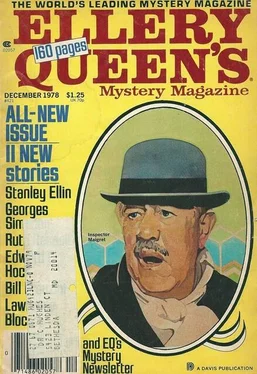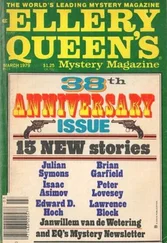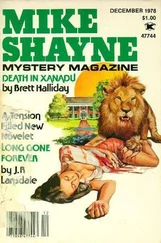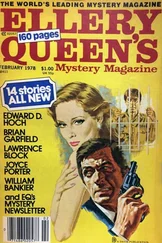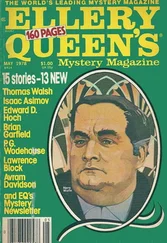Ehrengraf didn’t doubt that for a moment. “My client might supplement that income of yours,” he said thoughtfully.
“You think I’m a blackmailer?”
“I think you might profit by circumstances, Mr. Mayhew.”
“Fie on it, sir. I’d have no truck with blackmail. The Mayhews have been whitemailers for generations.”
The conversation continued, but not for long. It became quite clear to the diminutive attorney that his was a limited arsenal. He could neither threaten nor bribe to any purpose. Any number of things might happen to Mayhew, some of them fatal, but such action seemed wildly disproportionate. This housebound wretch, this malevolent cripple, had simply not done enough to warrant such a response. When a child thumbed his nose at you, you were not supposed to dash its brains out against the curb. An action ought to bring about a suitable reaction. A thrust should be countered an appropriate riposte.
But how was one to deal with a nasty madman? A helpless, pathetic madman?
Ehrengraf, who was fond of poetry, sought his memory for an illuminating phrase. Thoughts of madmen recalled Christopher Smart, an eighteenth-century who was periodically confined to Bedlam where he wrote a long poem that was largely comprehensible only to himself and God.
Quoting Smart, Ehrengraf said, “‘Let Ross, house of Ross, rejoice with Obadiah, and the rankle-dankle fish with hands.’”
Terence Reginald Mayhew nodded. “Now that,” he said, “is the first sensible thing you’ve said since you walked in here.”
A dozen days later, while Martin Ehrengraf was enjoying a sonnet of Thomas Hood’s, his telephone rang. He took it up, said hello, and heard himself called an unconscionable swine.
“Ah,” he said. “Mr. Mayhew.”
“You are a man with no heart. I’m a poor housebound cripple, Mr. Ehrengraf—”
“Indeed.”
“—and you’ve taken my life away. Do you have any notion what I had to go through to make this phone call?”
“I have a fair idea.”
“Do you have any idea what I’ve been going through?”
“A fair idea of that as well,” Ehrengraf said. “Here’s a pretty coincidence. Just as you called, I was reading this poem of Thomas Hood’s — do you know him?”
“I don’t know what you’re talking about.”
“A sonnet called Silence. I’ll just read you the sestet:
“But in green ruins, in the desolate walls,
Of antique palaces, where Man hath been,
Though the dun fox or wild hyena calls,
And owls that flit continually between,
Shriek to the echo, and the low winds moan—
There the true silence is, self-conscious and alone.
“Don’t you think that’s marvelously evocative of what you’ve been going through, Mr. Mayhew?”
“You’re a terrible man.”
“Indeed. And you should never forget it.”
“I won’t.”
“It could all happen again. In fact, it could happen over and over.”
“What do I have to do?”
“You have to leave my client strictly alone.”
“I was having so much fun .”
“Don’t whine, Mr. Mayhew. You can’t play your nasty little tricks on Mr. Crowe. But there’s a whole world of other victims out there just waiting for your attentions.”
“You mean—”
“I’m sure I’ve said nothing that wouldn’t have occurred to you in good time, sir. On the other hand, you never know what some other victim might do. He might even find his way to my office, and you know full well what the consequences of that would be. Indeed, you know that you can’t know. So perhaps what you ought to do is grow up, Mr. Mayhew, and wrap the tattered scraps of your life around your wretched body, and make the best of it.”
“I don’t—”
“Think of Thomas Hood, sir. Think of the true silence.”
“I can’t—”
“Think of Ross, house of Ross, and the rankle-dankle fish with hands.”
“I’m not—”
“And think of Mr. Crowe while you’re at it. I suggest you call him, sir. Apologize to him. Assure him that his troubles are over.”
“I don’t want to call him.”
“Make the call,” Ehrengraf said, his voice smooth as steel. “Or your troubles, Mr. Mayhew, are just beginning.”
“The most remarkable thing,” Ethan Crowe said. “I had a call from that troll Mayhew. At first I didn’t believe it was he. I didn’t recognize his voice. He sounded so frightened, so unsure of himself.”
“Indeed.”
“He assured me I’d have no further trouble from him. No more limousines or taxis, no more flowers, none of his idiotic little pranks. He apologized profusely for all the trouble he’d caused me in the past and assured me it would never happen again. It’s hard to know whether to take the word of a madman, but I think he meant what he said.”
“I’m certain he did.”
They were once again in Martin Ehrengraf’s office, and as usual the lawyer’s desk was as cluttered as his person was immaculate. He was wearing the navy suit again, as it happened, but he had left the light-blue vest at home. His tie bore a half-inch diagonal stripe of royal blue flanked by two narrower stripes, one of gold and the other of a rather bright green, all on a navy field. Crowe was wearing a three-piece suit, expensive and beautifully tailored but in a rather morose shade of brown. Ehrengraf had decided charitably to regard the man as color blind and let it go at that.
“What did you do, Ehrengraf?”
The little lawyer looked off into the middle distance. “I suppose I can tell you,” he said after a moment’s reflection. “I took his life away from him.”
“That’s what I thought you would do. Take his life, I mean. But he was certainly alive when I spoke to him.”
“You misunderstand me. Mr. Crowe, your antagonist was a housebound cripple who had adjusted to his mean little life of isolation. He had an income sufficient to his meager needs. And I went around his house shutting things down.”
“I don’t understand.”
“I speak metaphorically, of course. Well, there’s no reason I can’t tell you what I did in plain English. First of all, I went to the post office. I filled out a change-of-address card, signed it in his name, and filed it. From that moment on, all his mail was efficiently forwarded to the General Delivery window in Greeley, Colorado, where it’s to be held until called for, which may take rather a long time.”
“Good heavens.”
“I notified the electric company that Mr. Mayhew had vacated the premises and ordered them to cut off service forthwith. I told the telephone company the same thing, so when he picked up the phone to complain about the lights being out I’m afraid he had a hard time getting a dial tone. I sent a notarized letter to the landlord — over Mr. Mayhew’s signature, of course — announcing that he was moving and demanding that his lease be canceled. I got in touch with his cleaning woman and informed her that her services would no longer be required. I could go on, Mr. Crowe, but I believe you get the idea. I took his life away and shut it down and he didn’t like it.”
“Good grief.”
“His only remaining contact with the world was what he saw through his windows, and that was nothing attractive. Nevertheless, I was going to have his windows painted black from the outside — I was in the process of making final arrangements. A chap was going to suspend a scaffold as if to wash the windows but he would have painted them instead. I saw it as a neat coup de grace, but Mayhew made that last touch unnecessary throwing in the sponge. That’s a mixed metaphor, from coup de grace to throwing in the sponge, but I hope you’ll pardon it.”
Читать дальше
